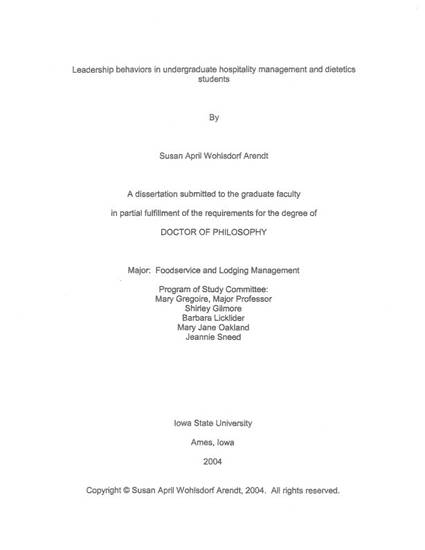
Hospitality management and dietetics students, employers, and futurists have indicated that leadership skills, abilities, and qualities are important for success. Educators have stressed the importance of developing leadership skills and behaviors in students. Therefore, the purpose of this research was to assess self-reported leadership behaviors and practices of hospitality management and dietetics undergraduate students.;Leadership questionnaires, including the Student Leadership Practices Inventory developed by Posner and Brodsky, were mailed to program directors at eight universities. A total of 345 hospitality management students' questionnaires and 283 dietetics students' questionnaires were returned and analyzed. Four focus groups were conducted with hospitality management and dietetics students. The focus group participants identified examples of each of the leadership practices examined in this study.;For the hospitality management students, no significant differences for mean leadership practice scores were seen based on age or supervisory work experience. However, significant differences (p < .05) were noted in several practice areas. Gender appeared to impact leadership practices. Students who had been appointed or elected to a leadership position had higher mean scores than those who had not held a leadership position. Students who indicated they had leadership coursework, lectures, or readings had higher overall mean scores than those without such academic preparation in three practice areas. The context of behavior most commonly reported was either in the class or at work.;For dietetics students, there were no significant differences in leadership behaviors based on college classification status or supervisory work experience. Leadership actions were more prevalent in students who had a previous leadership course or component, were older, and who had previous leadership experience. Students reported that they most frequently exhibit leadership in class as compared to other areas of their life such as home, work, and clubs/groups.;Future research needs include: (1) development of a reliable leadership assessment tool for dietetics students; (2) assessment of the best way to enhance leadership behaviors in future hospitality management and dietetics professionals and students and; (3) determination of methods to integrate leadership into hospitality management and dietetics classrooms that encourage the practice of leadership behaviors.
Available at: http://works.bepress.com/susan_arendt/5/
